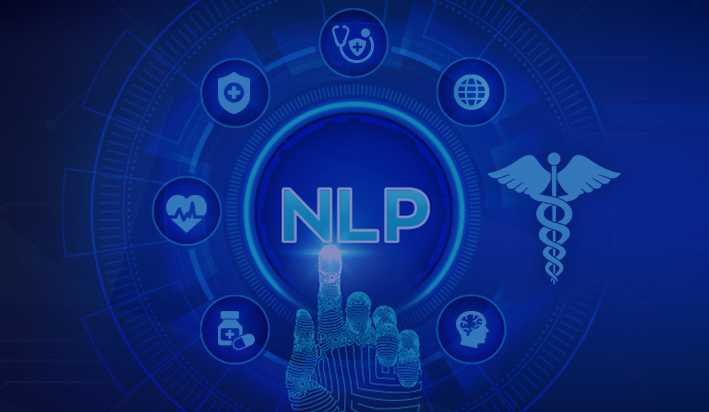Technological advancements continue to automate and change the world to function at a lightning-fast pace. Healthcare is no exception to this change. Numerous game-changing technologies are innovating legacy processes like patient registration/onboarding, records management, and self-care modules, making healthcare firms function hotfoot without compromising on the quality of service.
Besides providing a seamless experience for patients and their families, such advancements have brought a significant learning curve to healthcare professionals. Such learning curves have deepened the possibilities of research and innovations, solidifying the foundations of the healthcare sector for the years to come.
Amidst the many technological advancements in healthcare, Natural Language Processing (NLP) is one such, radically transforming the healthcare business worldwide. To all those hearing about this phrase for the first time or having a vague recall, Natural language processing (NLP) signifies the ability of a computer to understand human speech and text. This technology is widely used in Artificial Intelligence (AI) frameworks like email privacy and spam detection, voice assistants, and language translation applications.
“Patients come to Mayo Clinic with a history, and that history is well-documented but often buried in clinical notes. Extracting information from unstructured healthcare data across thousands of patients is a complex problem. Custom natural language processing solutions have a great potential to extract higher quality insights from these notes and to deliver more timely, and holistic patient care.” – Vish Anantraman (M.D. & Chief Technology Officer, Mayo Clinic)
NLP’s allyship with healthcare emerges with the technology’s default characteristics to search, analyze, and interpret a data input. NLP’s primary scope in healthcare is to transform unstructured data into actionable insights that can improve processes, quality, and outcomes for patients and stakeholders. Also, NLP uses specialized engines capable of scrubbing large sets of unstructured health data to discover errors in previously recorded patient conditions. When powered with machine-learning algorithms, NLP can even help in disease discovery. The possibilities are truly endless for NLP in healthcare.
NLP techniques and succeeding use cases that result in healthcare innovation
Optical Character Recognition (OCR):
A text recognition program through which a computer converts text (both handwritten and printed) into digital format. OCR is commonly used for digitizing clinical notes, medical history, forms related to patient care, discharge summaries, tests, etc.
Named Entity Recognition (NER):
An information extraction technique that segments named entities like people, places, companies, or products into buckets/categories. It helps healthcare businesses track fraudulent information and improves financial data accuracy.
Sentiment Analysis:
A combination of text, speech, and biometric data is computed in a statistical format to ascertain its underlying sentiment. It helps healthcare businesses better understand how the public perceives their products, services, or brand as a whole.
Text Classification:
A technique that analyses text data and assigns tags based on predefined categories. A healthcare provider might use text classification to identify at-risk patients based on a customized pool of tags or labels that have been pre-determined within their medical records.
Topic Modelling:
A form of statistical modelling used to group a collection of documents based on common words or phrases to identify semantic structures. This helps healthcare businesses deploy algorithms to track semantic relationships between two collections of documents or data sets.
When combined in innovative ways, such techniques result in tailored solutions that unlock the value of unstructured healthcare data.
Example: Google’s Cloud Healthcare Natural Language API aims to provide fully managed services that deliver the latest advances in natural language processing in an easy-to-use and easy-to-integrate manner. Healthcare organizations can then build intelligent systems to improve care and reduce cost while not worrying about the complexities of the underlying and fast-changing technology, thus enabling more open innovation in developing healthcare applications.
Organizations have been securely integrating and harmonizing data across many of their sources—patients, members, operations, research, and public databases—so they can quickly analyze it to get insights and make smarter, faster decisions.
Source: Google
The Future of Healthcare: Emerging NLP Use Cases
Some global healthcare businesses are instead taking an eager step forward to nuance the usage of NLP and take healthcare innovations to the next level. Listen below are a couple of the emerging NLP use cases in healthcare.
Financial Analytics:
Several analysts are optimistic about NLP technologies powering financial analytics through cognitive computing initiatives in the coming years. According to Allied Market Research, the cognitive computing market will be worth $13.7 Billion by 2020, growing at a 33.1% CAGR over current levels.
Advanced Processing:
NLP techniques are getting closer to bridging the gap between the enormous amount of daily data and the human mind’s limited cognitive ability. NLP has endless potential to change tons of electronic health records from a burden to a boon. Cutting-edge precision medical applications and processes involving claims/reimbursement now appear closer than ever.
Transforming unstructured data into actionable and life-saving insights is imperative for the decades ahead. At SRM Tech, we are deeply committed to helping healthcare businesses scale consciously with the help of tailored NLP solutions. These solutions will run on future-proof state-of-the-art AI and ML architectures, enabling healthcare businesses to truly harness business goals and patient care without any compromises. Speak to one of our business experts today to innovate your healthcare service delivery!






